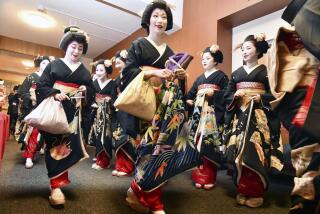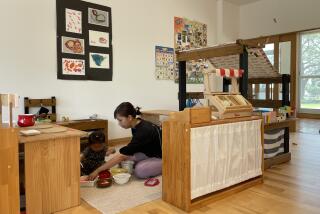Presents Delivered by Women in Bunny Costumes : Christmas in Japan--Traditional Touches and a Raucous Time
- Share via
TOKYO — Imagine a Christmas advertised by a five-story high poster of a woman wearing only a red ribbon. Presents are delivered by women in bunny costumes, and young people go off on Christmas Eve to eat lavishly.
To Americans and Europeans with fond memories of Christmas, Japan is not the place to be at this time of year.
In some superficial respects, the Japanese observe Christmas in much the same way as people do in other countries, even though Christians account for less than 1% of Japan’s population of 120 million.
For example, there is hardly a Japanese city without at least one tall, brightly lighted Christmas tree. And the decorations along the Ginza, Tokyo’s main shopping district, compare with those in New York or Paris. This year, the outside of the Ginza’s eight-story Mitsukoshi department store has been done up to look like a huge gift box, wrapped in a red ribbon.
Children in Japan get presents at Christmas just as children elsewhere do, and roughly 40% of the country’s annual toy sales are concentrated in the month of December. Computer games that cost $75 are the rage this year.
Santa Letters Boom
And lately a boom in letters to Santa from Japanese children has clogged post offices in Finland, Sweden and Norway. The president of an advertising company in Tokyo quietly runs a volunteer operation that responds to about 100,000 of the letters every year.
Christmas cakes have become a kind of symbol of the mass observance of the foreign festival. Ten of Japan’s major confectionary chains hope to sell 7 million of the hard, dry cakes over a period of three days.
But there are stark differences, too.
John Bisazza, an American who teaches linguistics at a Japanese university, recalls that on Christmas Eve a few years ago he walked into a bar in his neighborhood and was shocked to find his Japanese friends all out of character--the men dressed as women and the women as men.
“The place is a perfectly normal local pub all other evenings,” Bisazza said, “but the rule was that on Christmas everyone had to come in the clothes of the opposite sex. To an American, it was not at all like Christmas. It was Halloween.”
Frivolous Period
There are economic and cultural reasons why a Japanese is just as likely to spend Christmas in a restaurant or a bar as at home.
Christmas, a warm but serious holiday for Christians, happens to coincide here with a frivolous period known as the time for bonenkai (literally, “forget-the-year” parties). The average Japanese employee is obliged to go to as many as 10 of these parties. As a consequence, perhaps, the most heavily aired television commercials at this time of year are for hangover cures and stomach salts.
What makes all the revelry possible is the distribution of winter bonuses to all but part-time workers. On one day recently, public employees were given the equivalent of $15 billion.
People in retail trade and entertainment are responsible for much of the carnival-like atmosphere, doing their best to separate the Japanese worker from at least some of his bonus money. For example, the woman wearing nothing but a red ribbon first appeared in the advertising of a leading department store. Delivery by bunny-attired couriers is new this year, started by the Seibu department store.
Christmas Sales Low
Despite the provocative advertising, Christmas sales in Japan are quite low as a proportion of yearend revenue. According to one department store source, 90% of the gifts Japanese buy in December are not for close family and friends but for distant relatives and superiors as part of a centuries-old custom known as oseibo . They are rarely expensive, and consist for the most part of vegetable oil, imported jams, wine or whiskey.
Such things as the department store poster and the bunny delivery service are little more than a veneer of foreign frivolity lending a bit of panache to an old local custom.
Still, Christmas in Japan is more than just tinsel and debauchery. Christmas Eve, like New Year’s Eve in the West, has become a time for lovers, and in the past few years Japan’s most expensive Western-style restaurants have done a brisk business on Dec. 23, 24 and 25. All 120 tables at the Tokyo branch of Maxim’s have been booked for those dates since last month.
New Year’s in Japan, on the other hand, is a holy festival when millions visit Shinto shrines and families gather from afar. In the final few days of this year, according to the semi-governmental Japan Travel Bureau, about 27 million citizens will jam trains and planes, heading for ancestral homes and shrines--while people in the West get ready to pop champagne corks.
More to Read
Eat your way across L.A.
Get our weekly Tasting Notes newsletter for reviews, news and more.
You may occasionally receive promotional content from the Los Angeles Times.










